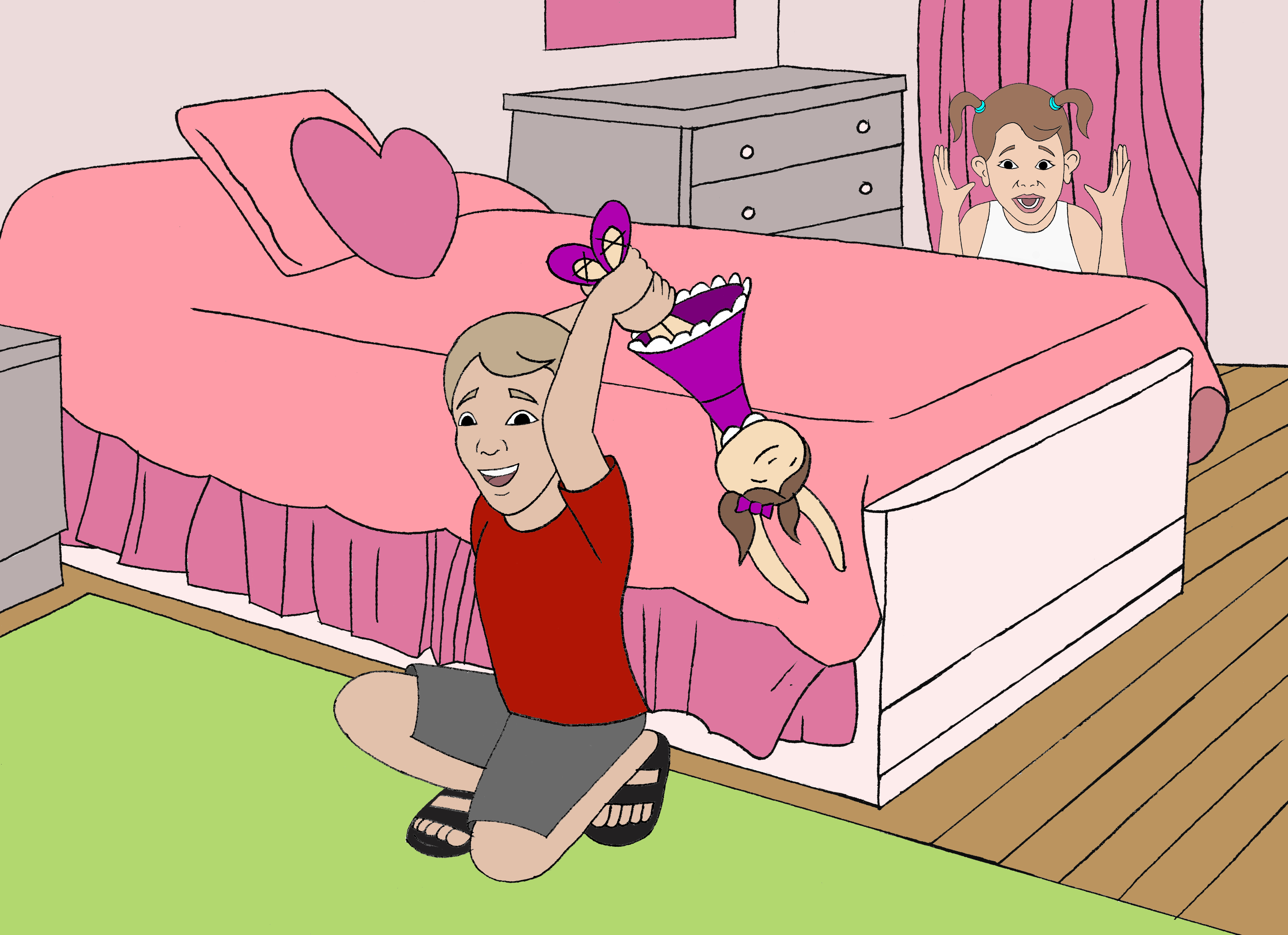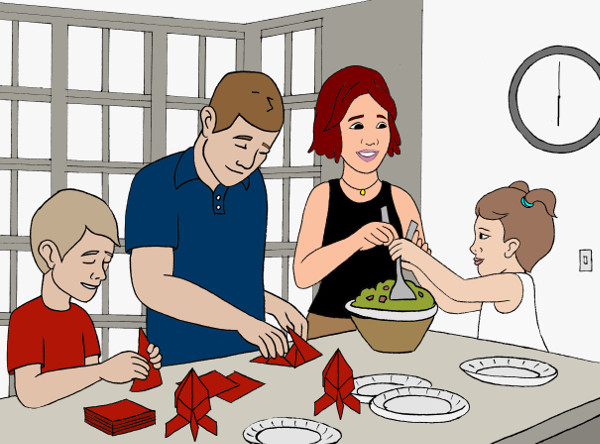Getting Started Using “READY-SET-GO GENTLY”
April Has Success
Let’s take a closer look at April Nelson. April is a good mother. If anything, she is trying too hard to be “perfect.” But at the moment she is feeling very out of control. Devin is five years old, and April is frustrated with him much of the time. Devin is energetic and active, and he is constantly “into something”. He pesters his little sister, Kyleigh. He leaves his toys scattered about. He is rough with the cat. The list goes on and on. Every day, April is constantly fussing at Devin.
- “Devin, don’t take that stuffed unicorn away from Kyleigh! It’s hers.”
- “Devin, do not run that toy car over the cat!”
- “Devin, how did you get hold of Daddy’s razor? Put it DOWN!”
As part of our story in our imaginary town of Sandy Bluff, most of our characters know Mrs. Esther Martin and often turn to her for advice. April ran into Esther on Tuesday, in line at the DMV. Devin was at preschool, and Kyleigh was asleep in her stroller, and April began to pour out her frustrations. Esther listened, and then she asked April what sounded like a simple question. She asked April to count up, in a day, how many times she fusses at Devin, how many times she praises Devin, and how much time she spends playing happily with Devin. April was rather astonished when she began to think about this. She was quite sure that in the course of a day, she fussed at Devin hundreds of times. She praised him some, maybe 5 or 6 times. But she rarely played with him at all. Her husband, Benjamin, played with him outdoors at times.
“Hold that thought,” said Esther, “because I want to ask you one more question. How many times do you tell Devin to do something, before he finally does it?”
“OH!” replied April. “It probably takes ten times before he’ll finally mind me. If he ever does.”
Esther then explained a bit about how she has done things through the years with her children and now with her grandchildren. Her husband, Alford, always called it “bird dog training for little humans,” but Esther was not entirely comfortable with that term. So Esther actually coined the term “READY-SET-GO GENTLY.” Esther often uses those words inside her own head when she is with her grandchildren.
Esther explained the basic concept of always being READY. “Being a parent is not for wimps,” she said. April laughed and definitely agreed. Esther explained about “ask once, with a calm SET request.” She stated that the follow up, the GO GENTLY, is often very simple, but it does require quick thought. It should be appropriate and specific to the situation. Esther also mentioned the importance of PRAISE, and that positive interactions eventually need to outnumber negative interactions. The two ladies exchanged phone numbers so they could talk again.
The heart of the technique is the SET request: one calm, clear statement, made ONLY ONCE, and followed up with the GO GENTLY.

This is where April will start that very afternoon.
Let’s watch April later that day as she tries to prepare supper. Devin is banging Kyleigh’s doll on the floor as hard as he can. Kyleigh is screaming.
April takes a deep breath and thinks about her “READY.” Can she just ignore this behavior? No. Devin is deliberately being mean to his sister. April must do something.
April does a “SET.” In a calm voice, she states what she wants Devin to do. Once. “Devin, give Kyleigh her doll now, please.”
Devin continues to bang the doll on the floor.
April does a GO GENTLY. She walks over to Devin, takes the doll from him, and hands the doll to Kyleigh. She says nothing more. She returns to what she was doing. She gives neither child a great deal of attention at this moment. April is firm, but with gentle actions, not words.
Now, what happens next will depend on what each child does at this point.
What happens is that Devin gets one of his toy cars and uses it to run over Kyleigh’s doll. Two-year-old Kyleigh is also a force to be reckoned with. She gets another of Devin’s cars and throws it at him. Hard. A bruise is forming on Devin’s forehead.
Now Devin starts crying. “I gave her the doll back, and she hit me,” he wails.
April does another GO GENTLY. April doesn’t say anything. April walks over and takes both the doll, the two cars in use, and the plastic bin full of cars, and puts them all on a shelf out of reach.
Reason: There is no use arguing or fussing at this moment. April did not specifically tell Devin not to run the doll over with the car. On the other hand, he should have known better. Kyleigh had a right to stand up for herself, but on the other hand, Kyleigh may have done actual damage to Devin. If April allows an argument to ensue, both children can justify their actions. There is not much use fussing at either one of them, nor giving a lot of sympathy to either one of them. The point is that they need to take responsibility for acting better, but they cannot guide themselves to that better state. April has to guide them, using gentle actions.
Now, both kids are screaming, and April needs another READY. This type of thing will get more automatic with practice. Right now, April has to think fast! Here are some possible actions:
- Distract both children by turning on a kid’s TV show.
- Give them a few minutes of attention by sitting down and playing cars and dolls with them.
- Have them both come to the kitchen and “help” with the supper preparations.
- Explain to them that they must play nicely, or they will both have to go to time out.
- Put them directly in time out.
- Go ahead and bring them to the table and feed them some crackers or something.
Note that there are no easy options here! Putting them in front of the TV, or feeding them, are the easiest choices. However, in a way, either of those actions is rewarding them for their misbehavior. So is sitting down and playing with them right now; plus, part of the problem is that everyone is hungry, so supper needs to be prepared. Putting them in time-out will take a lot of time and energy and delay supper even longer.
April is READY to change the situation in her house, so she chooses the most effective option.
She explains what will happen next by doing a “SET.” She says, “We need to get supper ready now. It is not playtime any more. Let’s all work together.”
April does a GO GENTLY. She picks Kyleigh up and heads for the kitchen. She has a small chair that the children can stand on to “help.” She places Kyleigh on the chair, well away from any hot surfaces. April gives Kyleigh a plastic spoon and a plastic bowl. Kyleigh is happy with this for a minute, which is a good thing, because Devin is trying to climb the shelves to get to his toy cars.
April is angry with Devin, but instead of yelling at him, she uses that energy to do another GO GENTLY. She says nothing. She simply walks to Devin, picks him up, and brings him to the kitchen also.
April instinctively realizes that her “SET” (to help get supper ready) was not very specific. Devin disobeyed, but April does not fuss. She does another, very specific, SET. She tells Devin calmly and clearly, “Devin, I want you to put paper plates and napkins on the table for us. There will be 4 people for supper. Each person needs one plate and one napkin. Can you count out 4 paper plates?"
Devin is proud that he can count to 4 so he decides to do this. He accidentally pulls half the paper plates out of the package, and the other half spills on the floor, but he does eventually get to the table with 4 plates. He successfully puts one plate at each place where the family members normally sit.
Meanwhile, April talks to both children while she works on the food. When Devin finishes with the plates, she immediately praises him! Praise is a POSITIVE GO GENTLY! April is specific and generous with Devin’s praise. She tells Devin she is so proud that he counted out 4 plates! He is so smart to be able to do that. Then, she praises Kyleigh for mixing her pretend salad so well!
April does not fuss about the spilled paper plates. That is something that happens with 5-year olds, and it was not a deliberate act of throwing plates.
Devin says, “Kyleigh can’t count to 4.”
April agrees, “No, only big boys can count to 4. Now, I wonder if you can count 4 napkins, too.”
Devin says, “I can, I can!”
April says, “Great! But wait. I think you know your colors, too. What color napkins should we use tonight? Go look and see what colors we have.”
April keeps working while Devin looks in the pantry. For some reason, assorted partly used packages of napkins tend to accumulate there. April talks to Kyleigh about salads. She lets Kyleigh help stir the real salad. Devin stares at the pile of napkins for a long while. Finally he says, “I am going to choose red. That’s because space ships are red.”
April says, “Devin, how about that! I am sure some space ships are red. That is a good choice. Can you get out 4 red napkins?” Again, this is a positive GO GENTLY. It does not matter what color Devin chose or why. April can affirm his decision. She can praise him for getting to the table with four napkins, no matter how many end up scattered on the floor on the way.

By the time supper is ready, both children have experienced about 20 minutes of positive interaction with April. They have gotten quite a bit of praise, all of which counts as positive GO GENTLYs. April thought this would be really difficult, but it wasn’t hard. She is not worn out!
Benji gets home right on time tonight, and Devin yells, “Hey look Daddy! I gave us space ship napkins for supper!”
Kyleigh bangs her spoon, “Me make salad Daddy!”
Supper is ready, and April is smiling mysteriously.
“Wow, you guys are awesome,” says Benji. He hugs everyone and then wisely scoops up the paper plates and napkins off the floor. Benji doesn’t know quite what has happened, but the difference in the household is obvious already!

